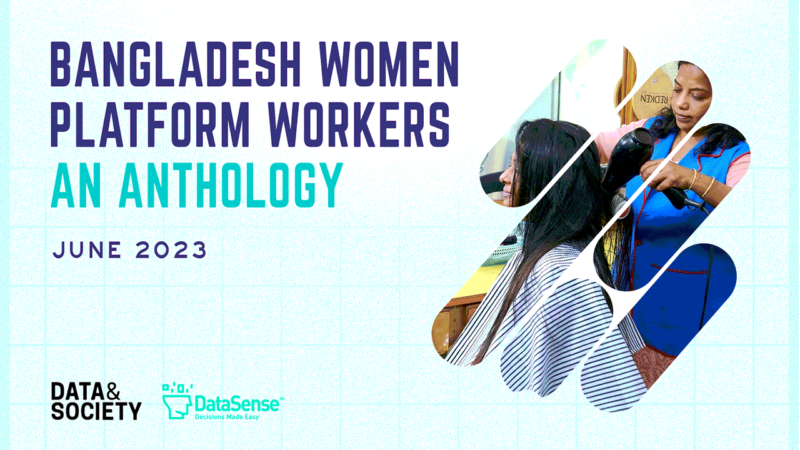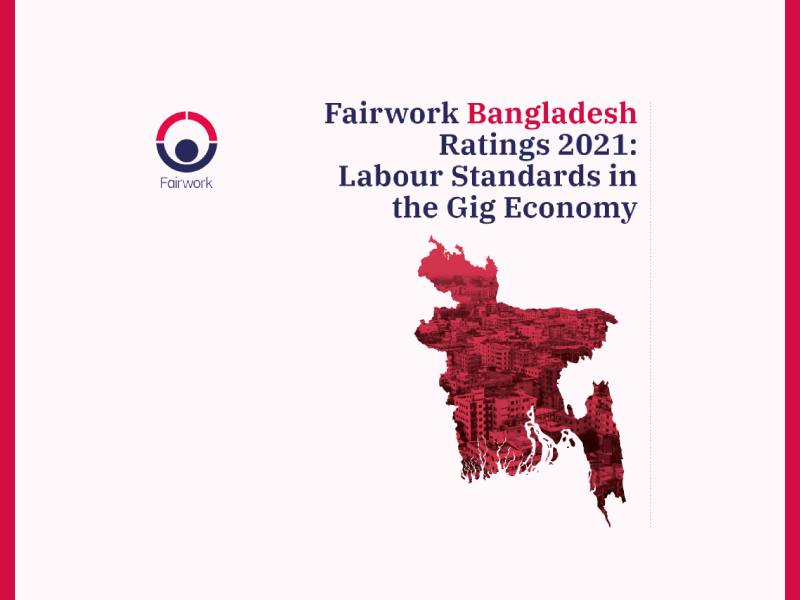Gig economy in Bangladesh: Challenges and paths to fairer platforms

Fairwork has spent the better part of this year researching the Bangladeshi platform economy and the report is finally set to be published in December. With the proliferation of the Internet and smartphones, the very nature of work has been transformed over the past decade. The employee-employer dynamic that was present in the previous century has started to evolve, paving the way for new forms of work that were unimaginable two decades ago.
[subscribe_to_unlock_form]
More so than anywhere else, this phenomenon is visible through the emergence of the platform-based gig economy. This relatively new industry exemplifies many of the challenges endemic to the new forms of labour that have been enabled by technological proliferation.
Though much needs to be done to ensure workers are treated fairly in the new digital economy, the Fairwork project of the Oxford Internet Institute offers prospects of reshaping the new labour relationship so that the ecosystem is sustainable for both the platforms and gig workers.
Fairwork has created a standardised framework for evaluating platforms globally and over the past years has produced localised reports on the gig economy of many different countries. Currently, Fairwork is working to publish annual reports for more than 20 countries.
Over the past decade, Bangladesh has experienced an online freelancing boom and is the world’s second-largest supplier of online labour, with over half a million active freelancers. The proliferation of Bangladesh’s digital infrastructure enabled the platform economy to rapidly expand over the past years, both in terms of the number of platforms and the number of total customers.
Many workers, who work through these platforms are considered to be “independent contractors”, rather than being recognised as the employees of these companies. As the labour laws in most countries are not equipped to deal with this sort of work arrangement, these independent contractors are often not protected, even though most of them work full time on these platforms.
The platforms are flourishing, utilising cheaper employment compensation, as labour laws of countries do not recognise this new type of workers and their contractual framework. As more and more people depend on the platform economy for their employment and livelihoods, there is a moral, economic, legal, and political imperative to ensure that these workers are treated fairly in the platforms they work for.
Taking this into consideration, Oxford Internet Institute launched the Fairwork Project in 2019 to work with platforms globally to help improve the working conditions of the gig workers. The project developed a globally applicable standard to rank platforms across different criteria to evaluate the overall conditions workers face.
Based on the rankings, Fairwork works with stakeholders, including the platform owners, to create a framework conducive to the growth of the platform economy with happy gig workers. The platforms are evaluated on five broad principles.
Together, the principles provide a detailed perspective on the various aspects of work experience that workers face working on the different platforms. They are:
Fair pay: ensuring workers receive a decent wage on time after accounting for work-related costs and active hours.
Fair conditions: ensuring policies and actions necessary to protect workers from the risks that come with their jobs.
Fair contracts: ensuring the existence and practice of clear terms and conditions to eliminate worker exploitation.
Fair management: ensuring due process for the decisions that affect workers.
Fair representation: ensuring freedom of association and expression of the collective voices of the workers.
Research for the Fairwork report undergoes several stages of data collection. The process begins with desk research, where the researchers engage in a fact-finding mission to map out the platform economy climate, identify relevant areas of investigation, and engage in secondary research.
This is followed by the researchers approaching the platforms for evidence regarding their performance in each principle. This provides insights into the operations of the platform, while also opening up a dialogue through which the platform could improve its working conditions.
The final stage includes gathering data directly from platform workers. The researchers engage in in-depth interviews with the workers to uncover facts about their experience of working for the different platforms.
After these phases, the researchers analyse the collected data and assign scores to the platforms based on their performance in each of the principles. Finally, the findings and scores are compiled and published to the public in the annual Fairwork report.
Starting in 2019, Fairwork has published annual reports about the platform economies in six different countries, offering in-depth analysis about the local context and the state of platform worker rights in the respective countries.
As the report is published annually, it allows for the changes of the platforms to be recorded over time and assess how their treatment of their workers changes across the period. Platforms can then also evaluate their scores in the report and identify areas to improve in.
For instance, Mr. D, a food delivery app in South Africa, score 0 points across all categories in 2019. The next year, however, the platform improved substantially across all principles and its total score increased to 7 points out of 10.
Of course, the inverse can also be tracked – Uber in India, for example, scored 2 points out of 10 in 2019, but dropped to just 1 point the next year, due to them not covering the worker’s costs adequately in 2020.
Fairwork has an impact-driven focus that mobilises on the findings of the report and attempts to engage policymakers, consumers, and the platforms themselves to push for meaningful improvements in the overall working conditions of platform workers in the country.
In Germany, for example, Fairwork has been endorsed by prominent policymakers and was even included in the German Federal Government’s Digital Implementation Strategy. For consumers, Fairwork provides an ethical imperative by revealing how platforms treat their workers, anticipating that consumers will gravitate towards platforms that treat workers better and avoid the ones that do not.
Finally, Fairwork uses its findings to work with platforms directly to identify and help them improve in areas of deficit. In India for instance, Fairwork has actively engaged with four platforms this year to have a direct role in improving the conditions and standards of work in the platform economy.
As Bangladesh’s platform economy has undergone unfettered growth over the past years, Fairwork’s Bangladesh report is crucial to take stock and evaluate how the workers in the platform economy are being treated.
It has spent the better part of this year researching the Bangladeshi platform economy and the report is finally set to be published in December. The aggregate level ranking may be similar to the experience of South Africa, where the platform did not score well enough.
However, it may serve as the critical benchmark for future change to happen in a positive direction. Ultimately, Fairwork’s purpose is to push for a fairer platform economy- one where the workers in platforms are treated with dignity and fairness.
Raiyaan Mahbub is a research associate at DataSense.
Featured image credit: Over the past decade, Bangladesh has experienced an online freelancing boom and is the world’s second-largest supplier of online labour. Photo: Ahmad Shabib Abdullah
[/subscribe_to_unlock_form]
![]()



